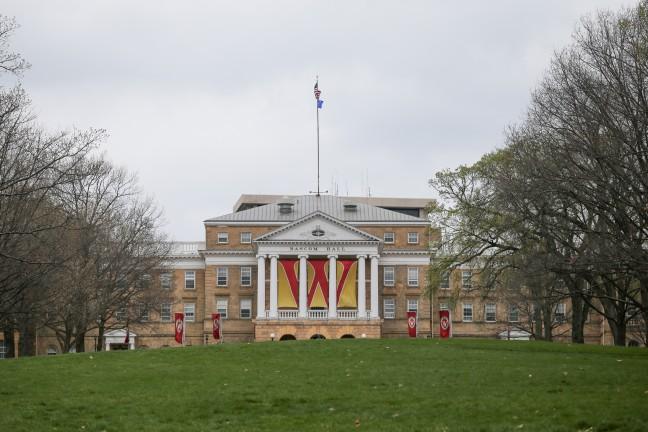Universities of Wisconsin professors are raising concerns over proposed changes to the system’s copyright policy.
Currently, faculty at all UW campuses retain ownership of the materials they create for teaching, such as lecture notes, slides and readings. The new policy would grant the UW broad rights over these materials, even after a faculty member leaves the system.
Copyright ownership of scholarly works would originate within the UW under the new policy. This right would be transferred to faculty creators as is customary in higher education, Director for Media Relations for the Universities of Wisconsin Mark Pitsch said in an email statement to The Badger Herald.
“This policy is necessary for UW authors to own the copyright to scholarly works,” Pitsch added.
Executive Director of the Center for Teaching and Research in Writing at UW-Madison Michael Bernard-Donals said the timing of the proposal is puzzling.
Bernard-Donals said the current policy has been in place for nearly two decades without issue and the revision seems unnecessary.
“Why now?” Bernard-Donals wrote in an email statement to The Badger Herald.
Bernard-Donals pointed out the proposed policy shift would give the university control over materials created by faculty members and argued this kind of change might make faculty members wary of sharing their materials and thus discourage faculty from sharing their work with the university.
“Why would a faculty member devote years creating course material, notes, slides and textbooks when the university could just assert copyright over that material and monetize it?” he wrote.
Professor in the Departments of Sociology and Communication/Journalism at UW-Eau Claire Peter Hart-Brinson shared similar concerns about the policy’s potential impact.
Hart-Brinson noted the current policy has long allowed faculty to maintain ownership of the materials they create.
“The proposed policy claims ownership of all of those things [instructional materials] … the tables have turned around 180°,” he said. “That’s a dramatic shift in control.”
Hart-Brinson also worried the policy would have heavy consequences for faculty who leave the university. The change in copyright policy would hypothetically allow the UW to continue teaching his courses even after he leaves the university without his consultation as the original creator, he said.
Hart-Brinson also expressed concern that the policy could contribute to the commercialization of education.
“Teaching doesn’t work like the process of producing an iPhone or a sweater,” he said. “It’s not something that any one machine is as good as any other.”
Hart-Brinson said the personal relationship between professors and students is a key factor in motivating students to take control of their education.
Associate professor in the Department of Biological Sciences at UW-Parkside Natalia Taft also criticized the proposed changes.
Taft explained she feels the policy change represents an overreach by the university administration.
“I think many professors feel that the proposal goes too far, and there should have been more dialogue with campus governance groups before it was introduced,” Taft said.
Taft said faculty involvement is necessary when making decisions about their work, particularly in areas as significant as copyright policy.
Taft also voiced concerns about how the policy might lead professors to provide students with less access to online materials to protect their work.
“Faculty will become more cautious about what they share and that could harm the learning experience for students,” Taft said.
Taft argued the policy could discourage professors from posting valuable teaching resources or engaging in collaborative work with students and other faculty members.
The proposed policy would not only grant the UW ownership of course materials but also exclusive, perpetual rights to use those materials without further approval from the original faculty creator.
“What the policy says, essentially, is that the university assigns copyright ownership to the author, but they also have exclusive rights to it, and we don’t have a say,” Taft said.
Like Hart-Brinson, Taft pointed out that faculty members would lose the ability to control the use of their work, even if they leave the university or retire.
While the UW administration has said the proposed changes are in line with current U.S. copyright law, many professors remain skeptical.
The Public Representation Organization of the Faculty Senate, a UW-Madison faculty advocacy organization, released a statement on Dec. 9 criticizing the proposed policy as broadly 0ver-reaching.
“Over-reach in limiting faculty copyrights would be seen as yet another attack on the work of the faculty, and would make it even more difficult to recruit and retain top faculty members,” the statement read.
Pitsch explained the policy aims to provide clearer and more specific guidance.
“The approach to copyright transfer in both the existing and draft policies remains unchanged,” Pitsch wrote.
Despite this assurance, many faculty members worry the policy will grant the university more control over their intellectual work and undermine academic freedom.
Bernard-Donals argued the policy could make universities treat faculty-created materials like commodities.
“With copyright control over course material, what’s to stop a university from bundling together syllabi, notes and PowerPoints and assigning non-experts to teach those courses?” he asked. “It has the potential to make courses into cookie-cutter modules, which could be a serious problem for academic quality.”
Taft and Hart-Brinson both expressed a similar concern, saying the policy could lead to less individualized teaching.
Taft said the move could ultimately harm the quality of online instruction, turning it into a standardized, one-size-fits-all model instead of a dynamic, personalized experience.
“Faculty should speak out if they disagree with this change,” Hart-Brinson said. “We need to ask why this is happening now and what’s driving the decision.”
Similar policies were introduced at Purdue University and the University of Michigan, but faculty pushback ultimately led to revisions or abandonment of the proposals, Hart-Brinson said.
A public comment period for the proposed policy changes was open until Dec. 13, and faculty members were urged to review the proposed revisions and submit their feedback.








